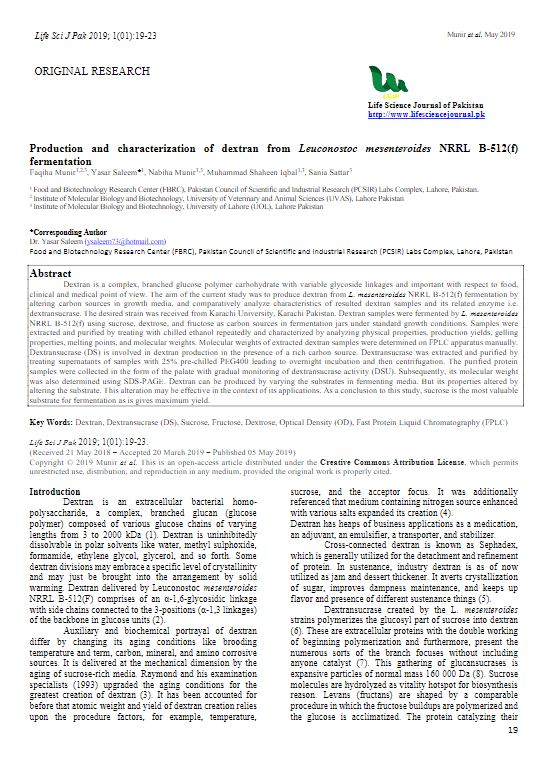Production and characterization of dextran from Leuconostoc mesenteroides NRRL B-512 (f) Fermentation
Main Article Content
Abstract
Dextran is a complex, branched glucose polymer carbohydrate with variable glycoside linkages and important with respect to food, clinical and medical point of view. Aim of current study is to produce dextran from Leuconostoc mesenteroides NRRL B-512(f) fermentation by altering carbon sources in growth media, and comparatively analyze characteristics of resulted dextran samples and its related enzyme i.e dextransucrase. Desired strain was received from Dr. Shah Ali-ul-Qadar and confirmed by microscopic and biochemical tests after re-culturing. Dextran samples were produced by L. mesenteroides NRRL B-512(f ) using sucrose, dextrose and fructose as carbon sources in fermentation jars under standard growth conditions. Samples were extracted and purified by treating with chilled ethanol repeatedly and characterized by analyzing physical properties, production yields, gelling properties, melting points and molecular weights. Molecular weights of samples were determined on FPLC apparatus manually. Dextransucrase (DS) is involved in dextran production in the presence of rich carbon source. Ds was extracted and purified by treating supernatants of samples with 25% pre chilled PEG400 leading to overnight incubation and then centrifugation purified protein samples were collected in the form of pellet and subjected to check enzyme activity in dextransucrase unit (DSU) and its molecular weight by SDS-PAGE analysis. Dextran can be produced by varying the substrates in fermenting media. But its properties alter by altering the substrate. This alteration may be effective in the context of its applications. Sucrose is the most valuable substrate for fermentation as it gives maximum yield.
 Life Science Journal of Pakistan
Life Science Journal of Pakistan
